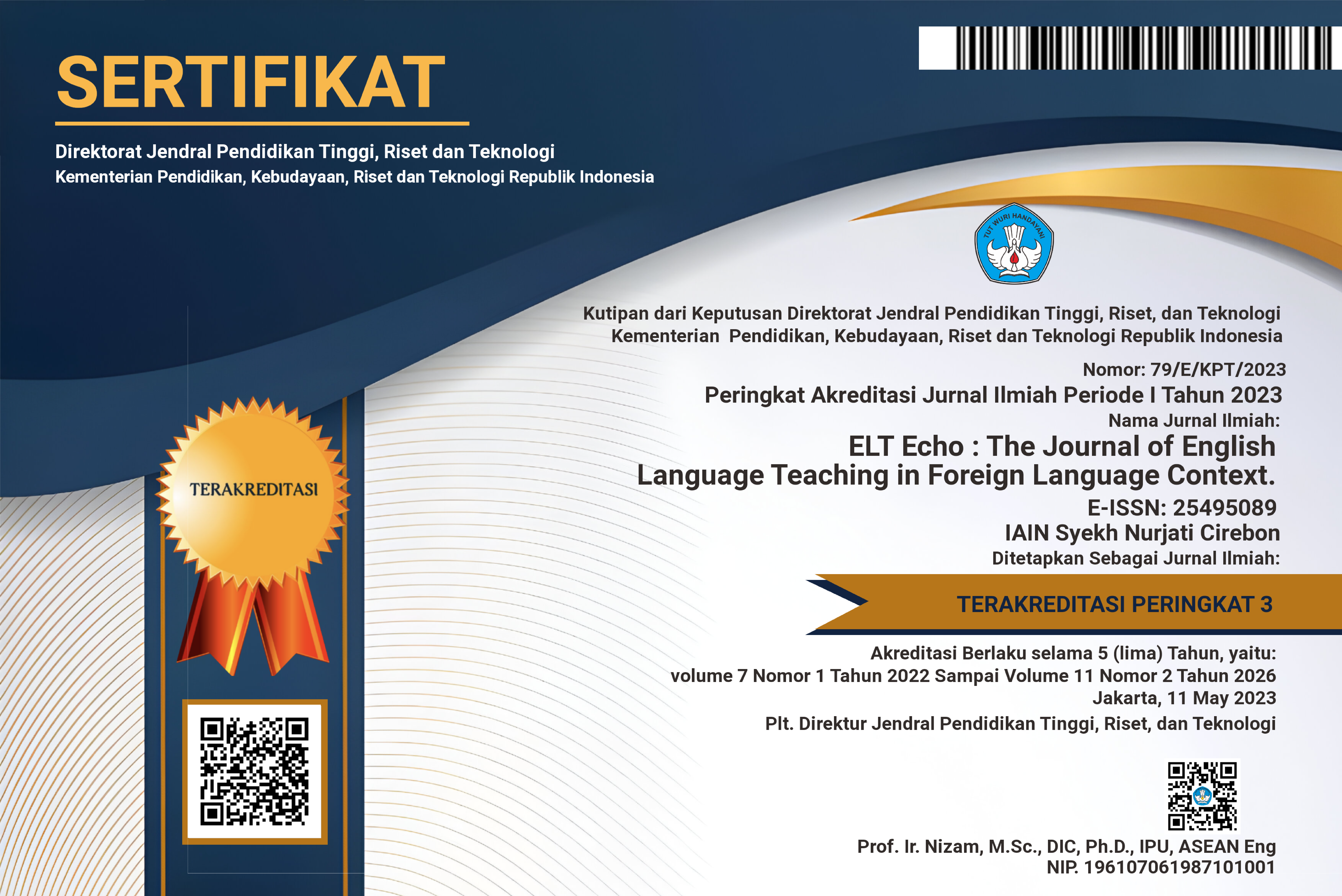AI-POWERED APPS TO ENHANCE NOVICE NEWSREADERS’ ENGLISH PRONUNCIATION
(1) IAIN Syekh Nurjati Cirebon
(*) Corresponding Author
Abstract
Keywords
Full Text:
PDFReferences
Abbas, M. F. F., & Fathira, V. (2020). Implementation of Android application to solve the students’ pronunciation of ending -ed. English Review: Journal of English Education, 8(2), 265-272. doi: 10.25134/erjee.v8i2.2648.
Al-mawaly, H. M., & AL-Jamal, D. A. (2022). The Effect Of Artificial Intelligence Application On Jordanian Efl Sixth-Grade Students' Listening Comprehension And Their Attitudes Towards It. Journal of Positive School Psychology, 8781-8791.
Al-Shawabkah, A. A. (2017). The role of AI applications (Expert Systems) in making administrative decisions in the General Saudi Banks, Ta’if Governorate. Ta’if University Magazine on Humanities, 49(15), 13−59.
Gilakjani, P. (2018). Teaching Pronunciation of English with Computer Technology: A Qualitative Study. International Journal of Research in English Education. DOI: 10.29252/ijree.3.2.94
Goksel, N., & Bozkurt, A. (2019). Artificial intelligence in education: Current insights and future perspectives. In Handbook of Research on Learning in the Age of Transhumanism (pp. 224-236). IGI Global.
Haryadi, S., & Aprianoto. (2020). Integrating “English pronunciation†app into pronunciation teaching: How it affects students’ participation and learning. JOLLT Journal of Languages and Language Teaching, 8(2), 202-212.
Hopkins, D. (2014). A teacher's guide to classroom research. McGraw-Hill Education (UK).
Kemmis, S., & McTaggart, R. (1998). The nature of action research. The Action Research Planner. Victoria: Deakin University.
Kemmis, S., McTaggart, R., & Nixon, R. (2013). The action research planner: Doing critical participatory action research. Springer Science & Business Media.
Kholis, A. (2021). Elsa speak app: automatic speech recognition (ASR) for supplementing English pronunciation skills. Pedagogy: Journal of English Language Teaching, 9(1), 01-14.
Krathwohl, D. R. (1993). Methods of educational and social science research: An integrated approach. Longman/Addison Wesley Longman.
McNiff, J. (2013). Action research: Principles and practice. Routledge.
Manns, U. N. E. S. C. O. (2017). Artificial Intelligence: Opportunities, threats and the future of learning.
McCarthy, J. (2007). What is artificial intelligence.
Nihalani, P., & Lin, T. P. (1998). Intonation patterns in news broadcasts. World Englishes, 17(1), 15-29.
Russell, S. J. (2010). Artificial intelligence a modern approach. Pearson Education, Inc..
Sagor, R. (2010). The action research guidebook: A four-stage process for educators and school teams. Corwin Press.
Suciati, S. (2021, June). Favourite Artificial Intelligence-based speaking applications for autonomous learning. In UNNES-TEFLIN National Seminar (Vol. 4, No. 1, pp. 205-214).
University Of Technology, S. (2016). Pronunciation Intensive academic program. 1–76. www.helps.uts.edu.au
DOI: 10.24235/eltecho.v7i2.12503
Article Metrics
Abstract view : 19 timesPDF - 3 times
Refbacks
- There are currently no refbacks.
Â
This Journal is indexed by:
Â

This work is licensed under a Creative Commons Attribution 4.0 International License.










